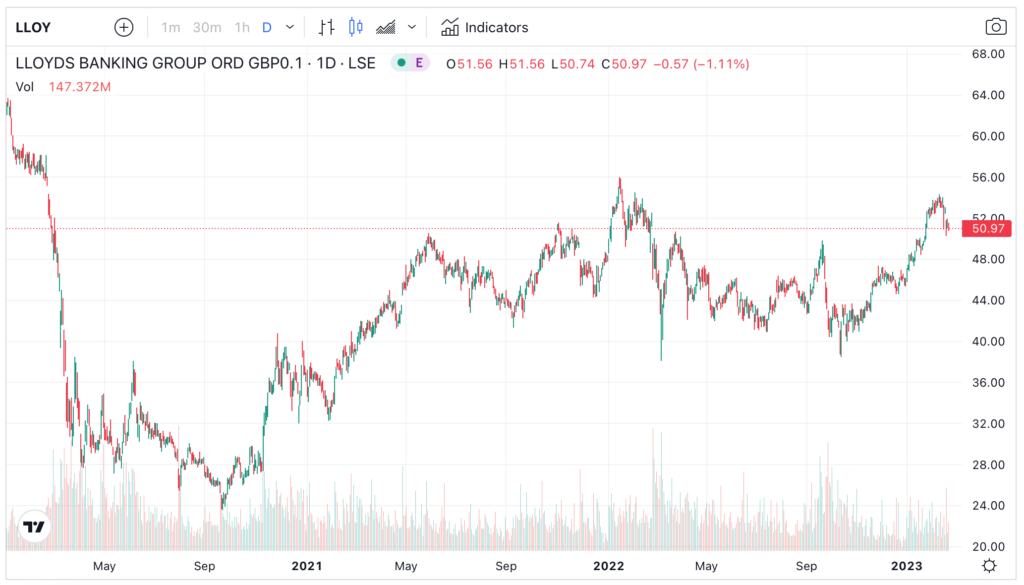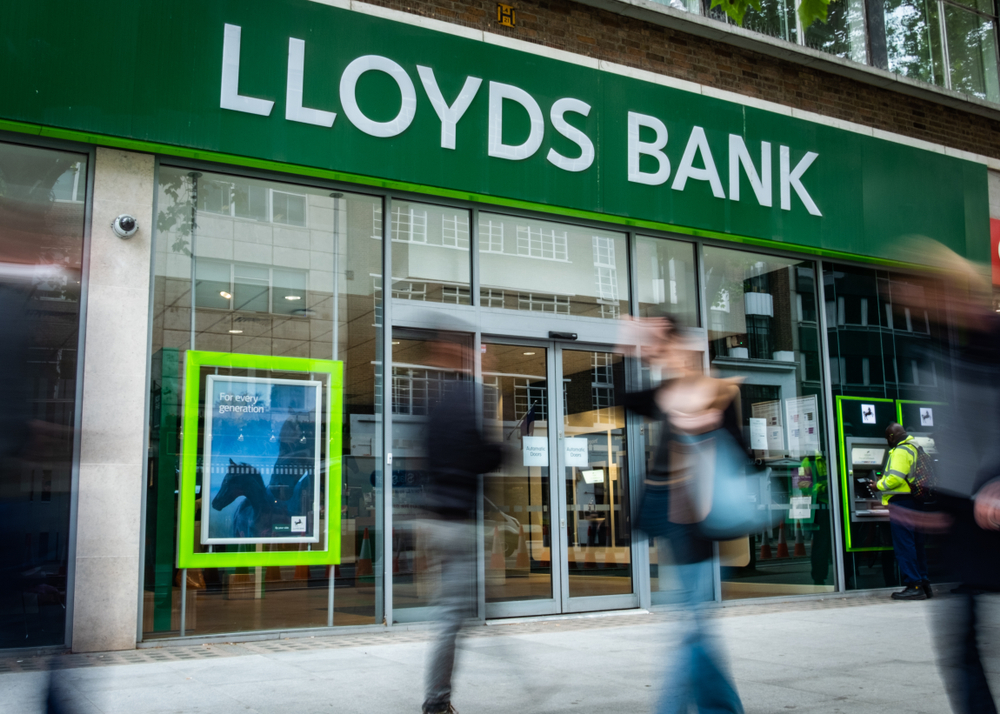Is Lloyds (LON:LLOY) a good investment in the long term?
The banking sector was dealt a hammer blow in the Global Financial Crisis back in 2008. Despite a decade of positive economic growth, Lloyds’ (LLOY) share price has yet to recover to the 2007 highs. In fact, no UK bank has. Those buoyant pre-GFC days saw Lloyds trade near 300p. Now? Closer to 50p.
Lloyds’ role in the GFC is a saga in itself. UK government partially nationalised the bank (through a 43% stake). Only through years of relentless hardwork did Lloyds finally wean itself from the Treasury in May 2017. Then, the pandemic hit and inflicted yet more credit losses on the company. The bank reported a £676m loss during 2020.
Why should you buy Lloyds shares? A good question, since banks are not exactly a hub of innovative entities. Growth is hard to come by and when it does, it is usually associated with the credit cycle.
Furthermore, banks are associated with the increasingly wobbly property market. Lastly, Lloyds is a UK-focussed bank. This means that investors are exposed to the underperforming UK economy. Some recent statistics show that the UK was FILO – first to go into a recession during the pandemic and the last to come out. Recent IMF statistics revealed that UK is predicted to be the only advanced country to show negative GDP growth in 2023.
That said, UK banks are not going anywhere. They will still be around decades from now. Perhaps they will be smaller or have merged into other entities. Nonetheless, they will continue to comprise a big chunk of the UK mortgage, banking and financial markets. When UK banks perform well, they do reward shareholders with rising share prices and dividends – like Lloyds is doing right now.
Even though 2022 appeared to be a horrendous year for investors, Lloyds managed to record a £1.8 billion pre-tax profit in the last quarter and a full-year pre-tax of more than £6.9 billion. Moreover, the bank is announcing a buyback programme worth £2 billion, on top of its regular dividends. Not a bad performance in light of the darkening economy.
Therefore, I would not discount buying UK bank shares like Lloyds for your portfolio.
The best time to buy Lloyds shares is when the credit cycle is at its most bearish.
For example, during the 2008 crisis or 1992 recession. In both cases, bank stocks were hit hard. But when they recovered, they multi-bagged over a short period of time.
The question is that of timing. How do we really choose to start buying? Well, there is no hard and fast rule on this. I would look for a few market markers:
- Is the bank in desperate need of more equity?
- Will the bank cut the dividends?
- Is there a potential for M&A (mergers and acquisition)?
Another point to look for is fear. Are investors discounting an overly bearish outcome on banks? When fear persists and the share price stop falling, I would ease gently into the stock over time, and then assess.
Earlier, I thought it was hard to say what valuation should bank command due to much uncertainties in the market.
Lloyds share price has swung 30 percent top to bottom in 2022, but in a reasonable well-defined trend (38-55p).
Fundamentally, Lloyds bank seems to be doing fine over the past few quarters. The most recent full year results saw its pre-tax profits top £6.9 billion while net interest margin rose to 2.94%. No surprises lurk in its balance sheet.
At £34 billion in market cap (Feb 2023), which translates into a price-to-post tax earnings ratio of 6-7. This is not a demanding valuation by any means – unless bad debt is set to rocket in the next few quarters. This will be seen as expensive as earnings shrink sharply.
Therefore Lloyds shares are probably not overvalued at this point. In a way, Lloyds share has some value proposition. That said, prices have rallied sharply since October and this may lead to a correction as traders book profits.

Source: Lloyds
The market climate for UK stocks was very poor in 2022, due to the rocketing inflation, a dire political situation (3 Prime Ministers in a year!) and the war in Ukraine. Unsurprisingly, Lloyds’ share price dropped from 55p to the low forties.
However, the bank is currently enjoying a rally due to:
- An improvement in market sentiment – as interest rates are now expected to go up slower than before.
- Putting ‘mini Budget’ turmoil behind us – more importantly, the skyrocketing mortgage rates have come down. This improves the outlook for the banking sector
- Steadier global economy – as Asia is now opening up fully, especially China
Chartwise, however, indicates a potential correction on the horizon. This is expected since Lloyds shares had a strong rally at the end of 2022. Prices gained 20-30% over a few short weeks and are now regressing from the early 2022 peak near 55p. The nearest support is at the 50p level, followed by another at 45p.

With the UK economy underperforming other economies, investors are not terribly confident about the performance of the UK banking sector. However, some brokers are seeing value in a few banks these days and are recommending more ‘Buy’ ratings on Lloyds.
According to the Financial Times, there are now 6 buys compared to 3 a year ago. There are also less ‘Hold’ or ‘Underperforming’ recommendations.
Despite this, the investment community is the uniformly bullish on the stock. The macro picture is simply not supporting a cyclical upswing just yet – hence we expect Lloyds to continue to range trade at 40-55p for the time being.

Jackson is a core part of the editorial team at GoodMoneyGuide.com.
With over 15 years industry experience as a financial analyst, he brings a wealth of knowledge and expertise to our content and readers.
Previously Jackson was the director of Stockcube Research as Head of Investors Intelligence. This pivotal role involved providing market timing advice and research to some of the world’s largest institutions and hedge funds.
Jackson brings a huge amount of expertise in areas as diverse as global macroeconomic investment strategy, statistical backtesting, asset allocation, and cross-asset research.
Jackson has a PhD in Finance from Durham University and has authored nearly 200 articles for GoodMoneyGuide.com.
You can contact Jackson at jackson@goodmoneyguide.com





